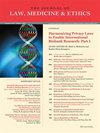行业资助本身并不是降低研究偏倚风险的理由。
IF 1.6
4区 哲学
Q2 ETHICS
Journal of Law Medicine & Ethics
Pub Date : 2024-01-01
Epub Date: 2024-12-16
DOI:10.1017/jme.2024.144
引用次数: 0
摘要
为了评估在有无行业资助的基础上研究特征和方法学方面的比较,Hughes等人对发表在三个主要医学期刊上的随机对照试验(RCTs)进行了系统调查。作者发现,行业资助的随机对照试验更有可能是盲法的,将结果发布在临床试验注册数据库(ClinicalTrials.gov)上,并获得高引用数相反,行业资助的试验样本量较小,更频繁地使用安慰剂作为比较物,使用替代物作为主要结果,并取得了积极的结果。本文章由计算机程序翻译,如有差异,请以英文原文为准。
Industry Funding by Itself is Not a Reason for Rating Down Studies for Risk of Bias.
To evaluate how study characteristics and methodological aspects compare based on presence or absence of industry funding, Hughes et al. conducted a systematic survey of randomized controlled trials (RCTs) published in three major medical journals. The authors found industry-funded RCTs were more likely to be blinded, post results on a clinical trials registration database (ClinicalTrials.gov), and accrue high citation counts.1 Conversely, industry-funded trials had smaller sample sizes and more frequently used placebo as the comparator, used a surrogate as their primary outcome, and had positive results.
求助全文
通过发布文献求助,成功后即可免费获取论文全文。
去求助
来源期刊

Journal of Law Medicine & Ethics
医学-医学:法
CiteScore
2.90
自引率
4.80%
发文量
70
审稿时长
6-12 weeks
期刊介绍:
Material published in The Journal of Law, Medicine & Ethics (JLME) contributes to the educational mission of The American Society of Law, Medicine & Ethics, covering public health, health disparities, patient safety and quality of care, and biomedical science and research. It provides articles on such timely topics as health care quality and access, managed care, pain relief, genetics, child/maternal health, reproductive health, informed consent, assisted dying, ethics committees, HIV/AIDS, and public health. Symposium issues review significant policy developments, health law court decisions, and books.
 求助内容:
求助内容: 应助结果提醒方式:
应助结果提醒方式:


